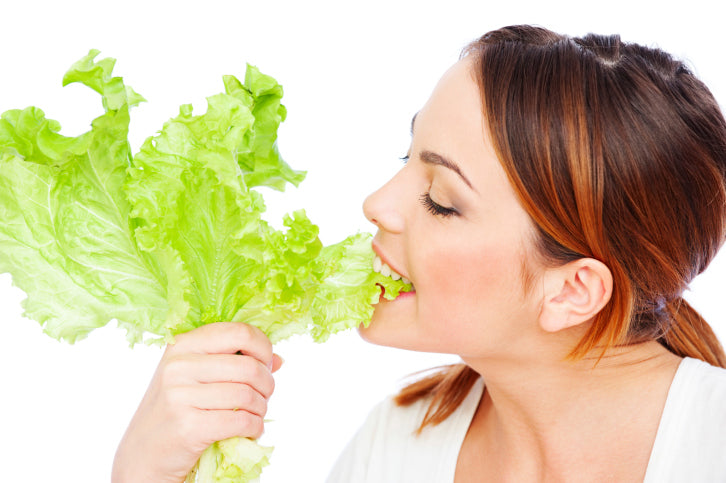Have you ever been in the health food store and seen the person who looks too skinny (all over), has lots of wrinkles in the face and hands and overall looks much older than they should for their age? Since the outward condition of the body is indicative of the health of the inner workings, we’ve often seen these types of individuals and thought to ourselves “We need to ensure we don’t do what they’re doing.” So what’s their problem? These people aren’t eating the wrong things but they haven’t been providing their body the nutrients that are necessary for it to thrive. Simply put – They have been too strict. Let us explain…
The Hallelujah Diet has been in existence for well over 23 years. In that time, we have had the distinct privilege of learning how people are faring while exclusively eating fresh vegetables, fruits, seeds and nuts with a lot of vegetable juices. We have conducted scientific studies and validated that someone on a vegetarian diet could be deficient in vitamin B12 and perhaps even vitamin D3 (the sunshine vitamin). Science eventually caught up and it is now common knowledge that people on the Standard American Diet (SAD) are typically deficient in these two vitamins just as well.
God created the perfect environment for growing perfect food in the Garden. Unfortunately our food supply has diminished in quality starting when Adam and Eve were removed from the Garden. The great flood continued the deterioration and the result of modern faming practices have depleted the nutrients to the point that the fruits and veggies we consume don’t have any similarity to those in the Garden. So, no matter how much we would like to emulate the Garden; the soil, the air, the seeds and the water will never be pure or fertile enough to capture the quality and purity of the food in God’s original garden.
At the Hallelujah Diet, we have created a formula that ensures that long-term health is maintained recognizing that our food supply has limitations. When we see someone who has been trying to eat healthy yet looks like the person we described in the beginning of this article we have found five common issues:
- They are too strict. God gave us an array of fruits and vegetables – “every herb bearing seed….” Most people consume just a handful of different vegetables – they get into a routine and unknowingly limit their variety. As we researched to find out exactly how many varieties of vegetables there are, we learned that it ranged from 400 to 4,000. If you were to evaluate the varieties of vegetables you consume within a week or even a month, how many different vegetables would you say you consume? Over 25? Over 50? Every vegetable has a different nutritional makeup. We’re not just talking about vitamins and minerals but also things like essential oils, enzymes, micro-nutrients and so on. So even eating a predominantly plant based diet over the long-term can lead to less than optimal health when we limit the variety of fruits and vegetables.
- They eat too much fruit. While fruit is great for cleansing; the vegetables are what feeds the body. As one changes their diet it becomes easy to rely on fruit because it is easy and convenient, not to mention that it tastes good, but without a higher concentration of vegetables, health over the long-term, will be compromised. That is why the Hallelujah Diet recommends limiting fruit to about 15% of daily food consumption.
- They don’t consume enough protein. When people are too strict and limit the variety of their food choices it is possible they will not consume enough protein to maintain optimal health. There are plenty of vegetable protein sources but most people don’t make a concerted effort to include enough variety of foods daily to cover their protein needs. Often, when people change their diet from the SAD to a healthier plant-based diet they start eating a lot of pasta type foods. This creates many issues including the fact that these starches cannot provide quality protein.
- They don’t consume enough cooked food. People who eat all raw usually are the strictest and have the least amount of variety in their diets. They don’t usually get enough protein or healthy fats – Omega 3’s. They also usually consume too much fruit. Most people who are all-raw like to brag about the fact that they are all-raw – it becomes a badge that they are proud of. Yes, it takes discipline but not including cooked foods and maintaining long-term health takes a lot of work and effort. While we love raw foods we have found that most people do better over the long-term when they consume 15% of their food cooked.
- They don’t consume enough healthy fats. Fats are important for many functions within the body – our brains don’t work properly without healthy fats and our skin becomes wrinkled not to mention dry and flaky with a sallow complexion. People on the SAD typically consume too much Omega 6 oils. Not only are nuts and seeds necessary but also avocadoes and fish oil need to be a part of the complete package helping to ensure that the need for long-chain, short-chain and medium chain fatty acids that are so vital for healthy skin and brain function including overall neurological function are being met.
- Has my stress level changed and could it be influencing my health?
- Have I developed any food sensitivities?
- Do I have an adequate amount of daily protein?
- Do I have an adequate amount of daily omega 3 fats?
- Do I need to re-evaluate my supplementation?
- Am I drinking enough juices and pure water?
- Am I getting quality sleep?







